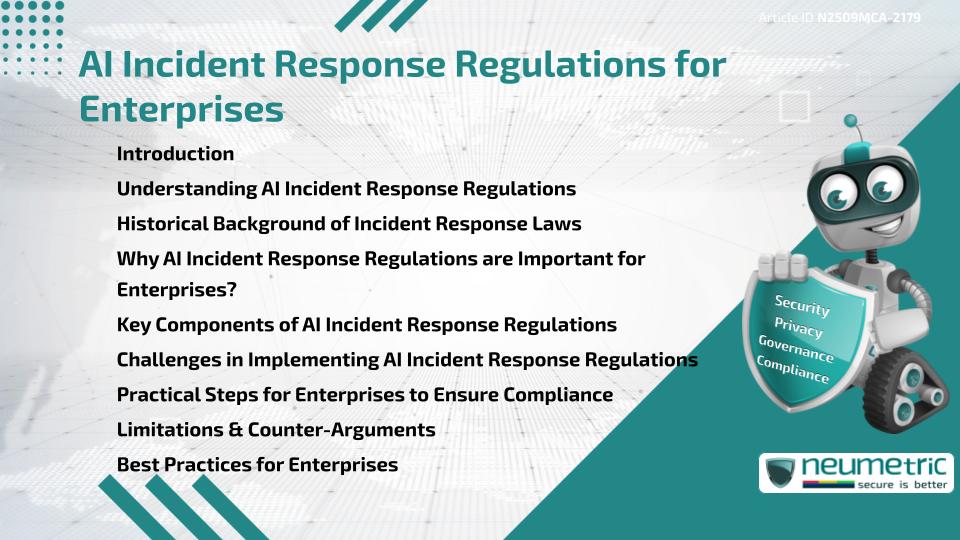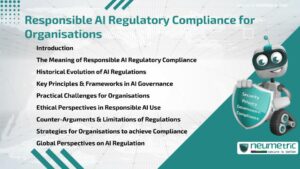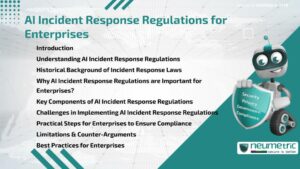Table of Contents
ToggleIntroduction
Artificial Intelligence is reshaping the way businesses operate, but it also introduces Risks that require careful management. AI Incident Response regulations are designed to help enterprises identify, manage & report security or ethical issues linked to AI Systems. These regulations aim to strengthen accountability, ensure transparency & protect Stakeholders from harm. Enterprises must navigate compliance with national & international laws, sector-specific requirements & ethical frameworks. Understanding the role & scope of these regulations is essential for Organisations that rely on AI for critical operations, from Finance & Healthcare to Manufacturing & logistics.
Understanding AI Incident Response Regulations
AI Incident Response regulations provide a structured Framework to deal with unexpected events, such as data breaches, biased algorithmic decisions or system malfunctions. These regulations guide enterprises in detecting incidents, analysing their impact, communicating with regulators & preventing recurrence. Unlike general IT security laws, they emphasise the unique challenges AI poses, including opacity in decision-making & potential large-scale consequences.
For example, the European Union’s AI Act sets obligations for high-Risk AI Systems, while the United States applies a mixture of NIST guidelines & sector-based laws. Together, these create a complex landscape where enterprises must carefully balance compliance & operational efficiency.
Historical Background of Incident Response Laws
Incident Response regulations have their roots in Information Security frameworks developed in the late twentieth century. Standards like ISO/IEC 27035 & laws such as the General Data Protection Regulation (GDPR) set early expectations for managing data & security breaches. As AI gained prominence, policymakers adapted these foundations to address AI-specific concerns such as algorithmic accountability & ethical decision-making. Today, AI Incident Response regulations extend these earlier models to account for the complexity & unpredictability of machine learning systems.
Why AI Incident Response Regulations are Important for Enterprises?
Enterprises face mounting legal, financial & reputational Risks from AI-related incidents. A misclassified transaction in a Financial system or a flawed medical recommendation from an AI tool can have life-changing consequences. AI Incident Response regulations help Organisations mitigate these Risks by enforcing accountability & transparency.
They also enhance Customer Trust. Stakeholders are more likely to engage with enterprises that can demonstrate robust compliance. In industries where regulatory oversight is strict, such as Healthcare or Finance, failure to comply can lead to significant penalties & loss of licenses.
Key Components of AI Incident Response Regulations
Most AI Incident Response regulations share common elements, including:
- Detection & Monitoring: Mechanisms for identifying anomalies in AI behaviour.
- Impact Analysis: Evaluating the severity & reach of an incident.
- Notification & Reporting: Clear procedures for communicating with regulators & Stakeholders.
- Remediation: Steps to correct the incident & prevent recurrence.
- Documentation: Maintaining transparent records of decisions & actions.
These elements ensure that enterprises can respond effectively while providing assurance to regulators & the public.
Challenges in Implementing AI Incident Response Regulations
Despite their importance, enterprises often struggle with implementing AI Incident Response regulations. Challenges include:
- Technical complexity: AI Systems are often “black boxes” with limited transparency.
- Cross-border compliance: Multinational enterprises must adapt to varying laws across jurisdictions.
- Resource constraints: Smaller enterprises may lack the expertise or funding for full compliance.
- Evolving standards: Regulations are updated frequently, requiring ongoing adaptation.
These challenges make compliance an ongoing process rather than a one-time effort.
Practical Steps for Enterprises to Ensure Compliance
Enterprises can take several practical measures to align with AI Incident Response regulations:
- Establish internal Governance frameworks that assign accountability.
- Conduct regular Risk Assessments tailored to AI Systems.
- Train Employees on identifying & reporting AI-related incidents.
- Use explainable AI tools to improve transparency.
- Partner with legal & compliance experts for jurisdiction-specific guidance.
Following these steps not only ensures compliance but also strengthens overall operational resilience.
Limitations & Counter-Arguments
Some experts argue that existing AI Incident Response regulations may overburden enterprises, especially smaller Organisations. Others suggest that strict compliance frameworks could stifle innovation & slow down AI adoption. Critics also note that regulations often lag behind technological development, leaving gaps in coverage.
However, without regulation, enterprises Risk greater exposure to legal disputes, ethical criticism & public mistrust. Striking a balance between flexibility & accountability remains the key challenge.
Best Practices for Enterprises
To maximize effectiveness, enterprises should integrate compliance with AI Incident Response regulations into their overall strategy. Best Practices include:
- Embedding ethical principles in AI System design.
- Engaging with regulators & industry bodies to stay updated.
- Simulating Incident Response scenarios to test preparedness.
- Documenting every step of the response process for transparency.
These practices ensure that enterprises not only comply with the law but also strengthen their reputation & Stakeholder trust.
Takeaways
AI Incident Response regulations are critical for safeguarding enterprises against the Risks posed by Artificial Intelligence. While they present challenges, compliance frameworks help ensure accountability, transparency & resilience. Enterprises that approach these regulations proactively can turn compliance into a competitive advantage.
FAQ
What are AI Incident Response regulations?
They are legal & procedural frameworks that guide enterprises in managing security, ethical or operational issues related to AI Systems.
How do AI Incident Response regulations differ from general IT laws?
Unlike general IT laws, they focus on AI-specific Risks, such as algorithmic bias, lack of transparency & potential large-scale impacts.
Why should enterprises prioritise AI Incident Response regulations?
Enterprises face financial, legal & reputational Risks from AI failures. Compliance minimises these Risks & builds Customer Trust.
Which industries are most affected by AI Incident Response regulations?
Sectors like Healthcare, Finance & Manufacturing face stricter requirements due to the high Risks associated with AI applications.
What challenges do enterprises face with AI Incident Response regulations?
They include technical opacity of AI Systems, varying Global Laws, limited resources & constantly evolving standards.
Are AI Incident Response regulations the same worldwide?
No, they differ across regions. For instance, the EU’s AI Act has broader obligations, while the US follows sector-specific laws.
Can compliance with AI Incident Response regulations improve enterprise reputation?
Yes, demonstrating compliance signals responsibility, builds Stakeholder trust & can provide a competitive advantage.
Need help for Security, Privacy, Governance & VAPT?
Neumetric provides organisations the necessary help to achieve their Cybersecurity, Compliance, Governance, Privacy, Certifications & Pentesting needs.
Organisations & Businesses, specifically those which provide SaaS & AI Solutions in the Fintech, BFSI & other regulated sectors, usually need a Cybersecurity Partner for meeting & maintaining the ongoing Security & Privacy needs & requirements of their Enterprise Clients & Privacy conscious Customers.
SOC 2, ISO 27001, ISO 42001, NIST, HIPAA, HECVAT, EU GDPR are some of the Frameworks that are served by Fusion – a SaaS, multimodular, multitenant, centralised, automated, Cybersecurity & Compliance Management system.
Neumetric also provides Expert Services for technical security which covers VAPT for Web Applications, APIs, iOS & Android Mobile Apps, Security Testing for AWS & other Cloud Environments & Cloud Infrastructure & other similar scopes.
Reach out to us by Email or filling out the Contact Form…





